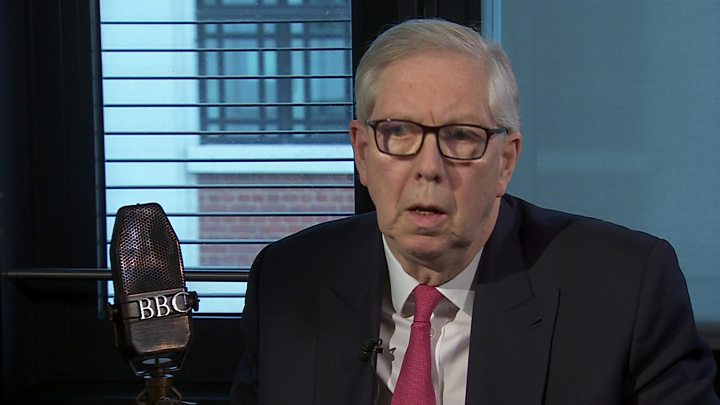Image copyright
Getty Images
The government has said the BBC must “do more to support older people” after the announcement that most over-75s will no longer get free TV licences.
Culture Secretary Jeremy Wright said he was “very disappointed” that the corporation had reached the decision.
But Labour deputy leader Tom Watson said the government had “breathtaking gall to blame the BBC for this mess”.
The BBC said restricting free licences to over-75s who claim Pension Credit was “the fairest and best outcome”.
Around 3.7 million pensioners are expected to lose out on the entitlement when the change comes into force in June 2020.
The decision comes four years after the government announced the BBC would take over the responsibility for providing free licences for over-75s by 2020 as part of the licence fee settlement.
At the same time, the BBC was allowed to increase the licence fee and make it obligatory to have a TV licence to use iPlayer. On Tuesday, Mr Wright told the House of Commons that was “a fair deal for the BBC”.
He also urged the corporation to “use its substantial licence fee income in an appropriate way”, which included showing “restraint on salaries for senior staff”.
He added: “I firmly believe that the BBC can and should do more to support older people. And I’m now looking to them to make clear exactly how they will do that.”
Getty Images
-
£745mEstimated cost to the BBC of current scheme by 2021/22
-
£250mEstimated cost of new scheme depending on take-up
-
190,000people consulted on the change
-
52%in favour of reforming or abolishing free licence scheme
The BBC said maintaining free TV licences for all over-75s would have cost £745m, a fifth of its budget, by 2021/22. The new scheme will cost the BBC around £250m by 2021/22 depending on the take-up.
Maintaining free TV licences for those pensioners was part of the Conservative Party manifesto at the 2017 general election.
Conservative Party leadership candidate Andrea Leadsom called for a reversal of the plan, describing the decision as “unacceptable”.
She said: “It’s a commitment in the Conservatives’ manifesto and we need to find a way to reverse that.”
Her leadership rival Esther McVey said she was “ashamed” of the BBC, which had “forgotten the public they are supposed to serve”.
Labour deputy leader Tom Watson told the House of Commons that voters who read the manifesto pledge “have been betrayed and it’s shameful”.
He continued: “The government had the breathtaking gall to blame the BBC for this mess, but passing the buck won’t work.
“The BBC is not the DWP [Department for Work and Pensions]. Public broadcasters should never be responsible for social policy.”
Labour leader Jeremy Corbyn said “providing over-75s with free TV licences is not too much to ask”.
Conservative MP Ed Vaizey, who was culture minister when the licence fee settlement was made, told MPs the government should “either take back this policy or support the BBC changes”.
He said: “I was in the DCMS [Department for Culture, Media and Sport] when this policy was imposed on the BBC by the Treasury to meet its £12bn welfare target, a target which I doubt we have met and has long been forgotten.”
He added: “It [the government] shouldn’t use weasel words that undermine the changes the BBC has brought about.”
Under the new rules, only low-income households where one person receives the Pension Credit benefit will still be eligible for a free licence.

Media playback is unsupported on your device
BBC chairman Sir David Clementi said it had been a “very difficult decision” but this was the “the fairest and best outcome”.
Funding free TV licences for all over-75s would have resulted in “unprecedented closures”, the BBC said.
The broadcaster said that BBC Two, BBC Four, the BBC News Channel, the BBC Scotland channel, Radio 5live, and a number of local radio stations would all have been at risk.
On Monday, Prime Minister Theresa May said she was “very disappointed” with the BBC’s decision.
Almost 150,000 people have signed a petition set up by the Age UK charity, which is calling for the government to take back responsibility for funding free TV licences.
Follow us on Facebook, on Twitter @BBCNewsEnts, or on Instagram at bbcnewsents. If you have a story suggestion email entertainment.news@bbc.co.uk.
